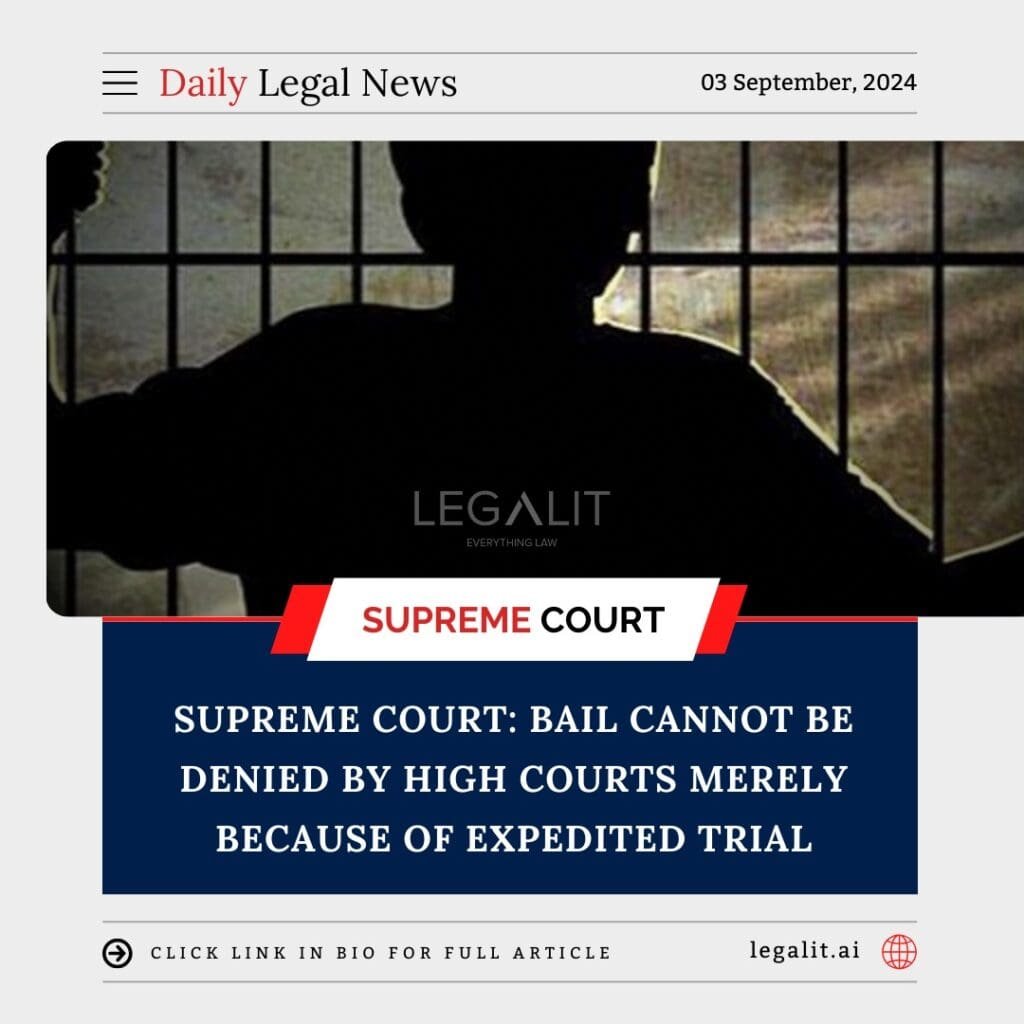
The Supreme Court of India has made a significant ruling that bail should not be denied by High Courts solely on the grounds that a trial is being expedited. The court emphasized that the right to bail is a fundamental aspect of personal liberty, and expediting a trial does not automatically justify the denial of bail to an accused person.
Background of the Supreme Court’s Ruling:
The Supreme Court made this observation while hearing an appeal against a High Court order that denied bail to an accused primarily on the grounds that the trial was being conducted on a fast-track basis. The accused, in this case, had sought bail after spending a considerable period in judicial custody without any concrete progress in the trial.
The High Court had refused the bail application, stating that since the trial was being expedited, there was no need to release the accused on bail. This decision was challenged in the Supreme Court, which provided clarification on the principles governing the grant of bail.
Key Points of the Supreme Court’s Judgment:
- Right to Personal Liberty: The Supreme Court underscored that the right to personal liberty is a fundamental right guaranteed under Article 21 of the Constitution of India. The denial of bail must be based on clear, substantive grounds such as the risk of flight, tampering with evidence, or influencing witnesses, rather than merely the pace at which the trial is being conducted.
- Expedited Trial Not a Valid Ground to Deny Bail: The court clarified that the mere fact that a trial is being expedited does not constitute a valid reason for denying bail. It noted that while a speedy trial is essential, it cannot replace the legal criteria required for granting or denying bail. The court held that an accused person’s liberty cannot be curtailed solely because a trial is on a fast track.
- Balancing Speedy Trial with Rights of the Accused: The bench highlighted the importance of balancing the right to a speedy trial with the rights of the accused. The court emphasized that while expediting trials is crucial to ensuring justice is delivered promptly, it should not come at the cost of violating the fundamental rights of the accused.
- Objective Consideration of Bail Pleas: The Supreme Court instructed that bail applications must be considered objectively and on their individual merits. Courts should examine the facts of each case, the nature and gravity of the offense, the accused’s conduct, the likelihood of the accused absconding, and other relevant factors while deciding on bail.
- Prevention of Prolonged Incarceration: The judgment reiterated that prolonged pre-trial incarceration should be avoided unless absolutely necessary. The court expressed concern over instances where undertrials spend years in jail without being convicted, noting that bail should be granted where appropriate to prevent unnecessary detention.
Broader Implications of the Supreme Court’s Judgment:
This ruling by the Supreme Court has several important implications for the Indian criminal justice system:
- Strengthening the Right to Bail: The judgment reinforces the principle that bail is a rule and jail is an exception. It aims to ensure that bail is not denied arbitrarily and that every accused person’s right to liberty is respected and protected unless there are compelling reasons to curtail it.
- Guidance for High Courts: The Supreme Court’s decision provides clear guidance to High Courts on handling bail applications. It reminds them that bail decisions should not be influenced by the speed of the trial but should be based on the merits of each case and the legal principles governing bail.
- Preventing Judicial Overreach: By setting limits on the grounds for denying bail, the Supreme Court prevents judicial overreach where courts might deny bail simply due to expedited trials, which could lead to unnecessary detention and compromise on personal liberty.
- Focus on Due Process: The ruling promotes adherence to due process and fair trial principles, emphasizing that every accused deserves a fair chance to defend themselves without undue prejudice or denial of rights.
Conclusion:
The Supreme Court’s ruling that bail cannot be denied by High Courts merely because a trial is expedited is a significant step toward protecting the rights of the accused and ensuring fair trial standards. It reinforces the importance of personal liberty, underscores the need for objective consideration of bail pleas, and prevents the arbitrary denial of bail based on procedural grounds alone. This decision upholds the balance between the right to a speedy trial and the fundamental rights of the accused, aligning with constitutional principles and the rule of law.